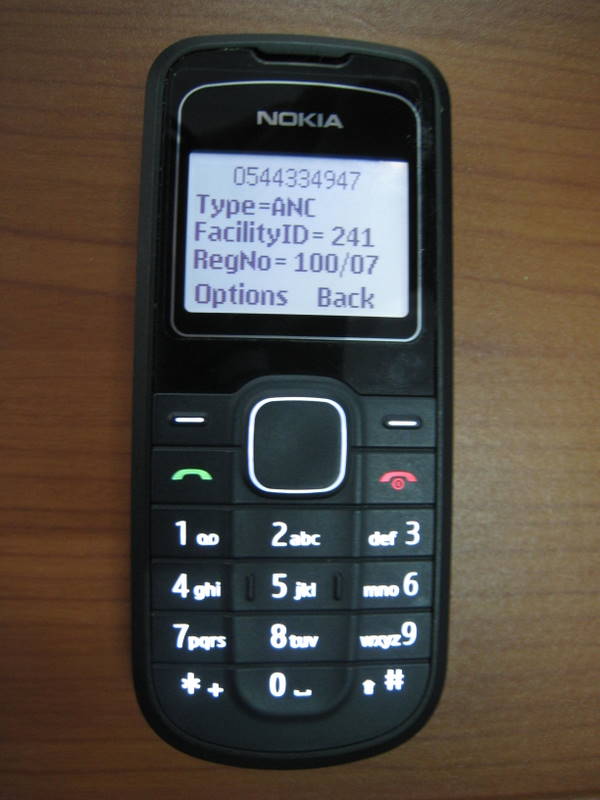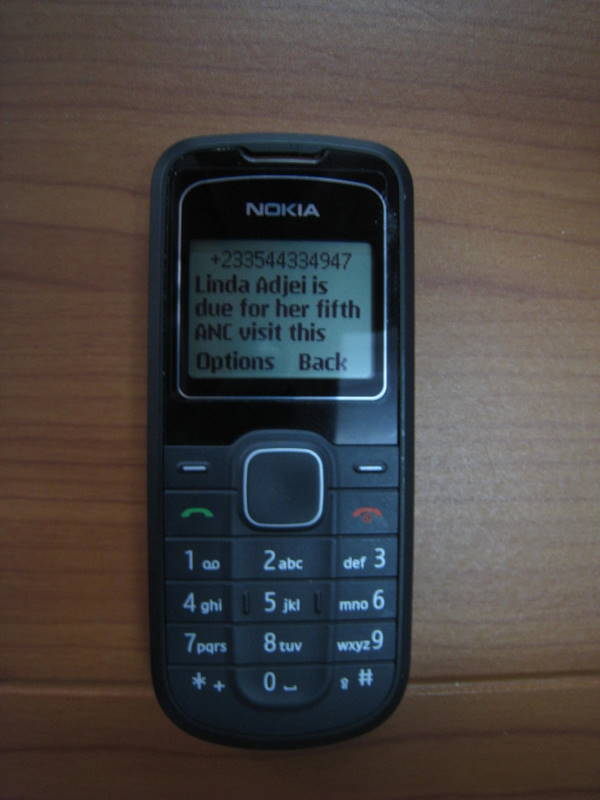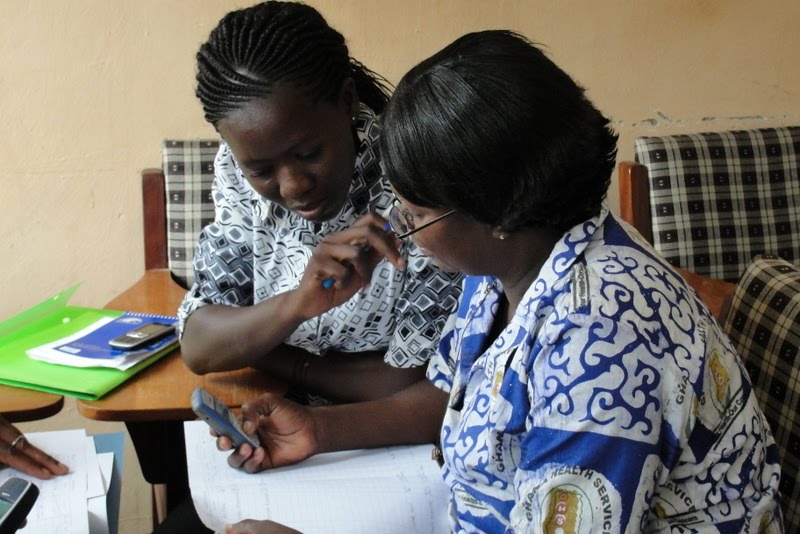In December we had our first workshop to introduce and test our mobile phone technology for MoTeCH to community health workers (CHWs) in the Upper East Region of Ghana. Prior to this workshop, much of our field research and testing has focused on building content for our “Pregnant Parents” application, but today we were focused on how MoTeCH can help practitioners deliver high quality antenatal and neonatal health care.
Our goals for the workshop were to learn as much about the challenges of entering patient information on simple mobile phones using structured SMS messages and also learn more about the types of features (notifications/reminders, queries, and reports) that would be helpful for CHWs to serve their patients better. We have had discussions with some CHWs in the past about MoTeCH functionality, but we had a feeling that until they saw the technology in action, they wouldn’t be able to completely grasp what we were building and how it could help them with their daily work. Hands on demonstrations would be essential for getting their creative juices flowing to contribute to our design process.
We started the day by having about 15 participants register their mobile phone numbers with us, load their phones with airtime, and receive ‘templates’ of the SMS message formats directly on their phones. These messages were saved to each person’s drafts folder so they could easily retrieve them later and enter patient encounters in the required format without needing to enter the full message each time. Messages looked similar to the following template:
 Type=ANC
Type=ANC
FacilityID=
RegNo=
Date=
VisitNo=
TTDose=
IPTDose=
HIVResult=
With Joyce Ndago and Maria Nuela, two of our MoTeCH field staff, facilitating the session, they showed everyone how to use the information provided on sample paper registers and enter this on the mobile phone. During the registration process, the MoTeCH team gave participants training on how write text messages on their phones, for those who were less familiar with SMS. We continued this training by working side-by-side with the CHWs as they entered information from the registers onto the phone. It was amazing how quickly even those who had not used text messaging in the past managed to begin entering data in the required formats.
To simulate t he interaction CHWs will have with the system with data entry triggering notifications and reminder messages, we had a modem capture incoming SMS messages. It was amazing to see the surprise and delight of the CHWs as they received a reminder that “Amina Philip (c/o Azia’s house, SAH 64, Gaani) is overdue for her fourth TT immunization”. Suddenly, MoTeCH made sense to them! As soon as the first person received her reminder from MoTeCH, she showed it around and soon everyone was waiting for their messages to come from MoTeCH also, and quickly entering information to see the feedback as soon as possible on their own phones.
he interaction CHWs will have with the system with data entry triggering notifications and reminder messages, we had a modem capture incoming SMS messages. It was amazing to see the surprise and delight of the CHWs as they received a reminder that “Amina Philip (c/o Azia’s house, SAH 64, Gaani) is overdue for her fourth TT immunization”. Suddenly, MoTeCH made sense to them! As soon as the first person received her reminder from MoTeCH, she showed it around and soon everyone was waiting for their messages to come from MoTeCH also, and quickly entering information to see the feedback as soon as possible on their own phones.
One of the best moments of the workshop came when Cecelia Addah, the very first community health worker for the CHPS system in Ghana, proclaimed how useful the system would be for catching and proactively reaching out to defaulters of their 3rd IPT dose – where compliance drops off dramatically from the first and second dose and women often deliver before receiving the recommended third dose. It was amazing to see that she could see the potential of the system to help with a wide variety of use-cases relevant to her work beyond just what was demonstrated.
Some of the other ideas for how our system could assist with the day-to-day work of CHWs in the Upper East Region of Ghana were as follows:
- Notifications of all types of defaulters: Overdue childhood immunizations, overdue TT immunizations, overdue IPT and IPTi treatments, missed deworming, etc.
- Reminders to follow up with patients that had been referred from the facility to another clinic: CHWs want to follow up with the patients they have referred both to ensure the patient has actually followed instructions to receive care at another facility as well as to learn from the outcome of the referral (how the patient was treated, whether the treatment was successful, etc) to educate themselves around effective referrals for the future.
- On-demand queries to help fill in their monthly reports
Data entry was not without its challenges though. With so many different phone models, it was impossible to anticipate and provide instructions on how to do things on each individual phone. We quickly found that the Nokia 1100, one of the oldest and most simple Nokia models owned by 3 participants, did not like the “=” signs in the message templates and prevented users from scrolling past the symbol to enter the value of the field. Other phones added in extra line breaks or strange characters when the messages were sent and received by our modem. But, seeing these realities first-hand by having users use their own phones (as we will do in our MoTeCH pilot), was invaluable to ensure we come up with a good design that works for all of our CHWs.
Based on the workshop, there are several things we will need to look into operationally. Some of the questions we will need to design around are:
- How will CHWs be able to confirm that all of the messages they have submitted for the day were successfully received by the system, so that their reports are accurate. Could we potentially provide a summary SMS message each day where they can easily see how many of each type of message was submitted and cross check the totals are complete?
- What will we do about the fact that many CHPS facilities do not have electricity and CHWs cannot charge their phones regularly? Many were concerned that their batteries will die after entering just a few messages per day.
- CHPS compounds are often ‘communication hubs’ with CHWs using their own phones to receive and make many calls to coordinate their work activities. There is often only one phone per CHPS compound. How will the CHWs manage to send and receive SMS messages to MoTeCH while constantly being interrupted by calls?
The workshop ended with a fun-filled contest where participants competed to enter messages as fast as possible. The first person to submit a message without any errors won a radio. Even after the winner was declared, everyone continued fervently racing to be the next one to get finished successfully. Our winners managed to finish in just 2-3 minutes per message – not bad for their first time using structured SMS messages of this sort! Our next steps will be to analyse the data that was entered to learn more about speed and quality of the data and use this as feedback to iterate on the design of the messages, as well as develop more detailed use-cases for reminders and queries that will help CHWs with their work. All of this, and more, will be re-tested in a mini-pilot with 4 nurses in Bongo district at the beginning of January where nurses will enter real patient encounter information on their phones as part of their regular routines so we can see how the system will operate in a real-life setting. All in all, our first round of design and testing with CHWs in the Upper East was a resounding success.
Posted by: Aliya Walji, MoTeCH Ghana Technical Program Manager
Tags: AppLab, CHW, Communication, Community Health Worker, Culture, Ghana, Grameen Foundation, Health, ICT4D, ICTI, Innovation, mHealth, Mobile, MoTeCH, SMS, Technology



Like it says later on you will have to look at a way for people to see a record of the sent messages… Great idea! Thanks for sharing!